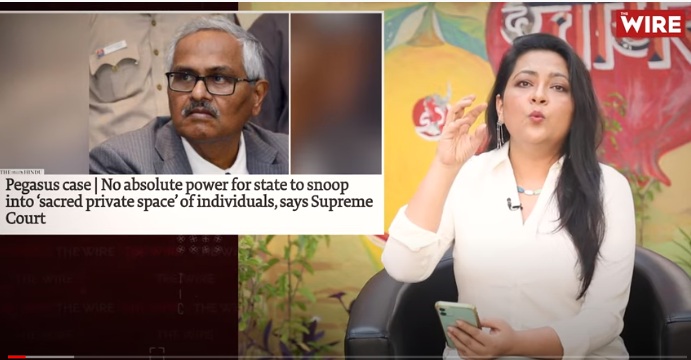The Facebook Crisis in India
The Facebook Crisis in India Might Be the Worst Facebook Crisis of All By Nitish Pahwa https://slate.com/technology/2021/10/facebook-papers-india-modi-misinformation-rss-bjp.html
Oct 26, 2021
Facebook ignored, downplayed, or failed to adequately address harassment, mis- and disinformation, and incitements to violence on its platform in several major countries. ..Yet the most shocking revelations concern the nation that serves as the app’s biggest user base: India, the world’s largest backsliding democracy.
.. the Facebook Papers confirm is not just that the network failed to curb Hindu nationalist hate speech and inadequately directed resources to monitor a nation with 340 million users; it also actively granted impunity to the worst offenders.
the company’s “misinformation classifiers”—automated systems trained on machine learning to detect and take down posts with harmful falsehoods—were not developed enough to recognize and take action on millions of multilanguage disinformation posts that proliferated across Indian feeds.
reports of BJP-linked cells using Facebook and WhatsApp to spread toxic rhetoric and lies surfaced as early as 2016; more such troll operations proliferated in the subsequent years, both within and without election contexts, and led directly to lynchings of religious minorities and riots stirred up by aggrieved Hindus...According to the Wall Street Journal, investigators zoned in on two BJP-linked Hindu nationalist organizations they pinpointed as key drivers of mass Islamophobia, the RSS and the Bajrang Dal, and recommended that the latter be banned. But it didn’t happen, as the company worried that removing the Bajrang Dal would anger Modi. The Journal revealed last year that the then-head of Facebook India, Ankhi Das, opposed applying hate speech rules to Hindu nationalists and BJP politicians.. (Das stepped down by October 2020.)
This year, Modi’s government has cracked down the hardest it ever has on Facebook and other social networks, forcing them to remove posts unfavorable to the BJP, condemning them for spreading content supposedly offensive to fundamentalist Hindus, and threatening to fully expel them if they don’t follow new, restrictive rules drawn up by the Ministry of Electronics and Information Technology meant to ensure compliance. The message is clear: If Facebook doesn’t follow the BJP’s Hindu nationalist dogma to a T, it can kiss its largest market goodbye.
SC Pegasus Ruling Historic; An Indictment of Modi Government: Dushyant Dave
SC Pegasus Ruling Historic; An Indictment of Modi Government: Dushyant Dave https://www.youtube.com/watch?v=x-Er8fzUM8g Oct 27, 2021
In a 18-minute interview to Karan Thapar for The Wire, Dushyant Dave, a former President of the Supreme Court Bar Association, said the judgement is based on the Supreme Court’s assumption that Pegasus was used and that the right to privacy of Indian citizens was breached. He says the language used by the Supreme Court about national security and privacy “clearly establishes the Court is worried about the infringement of citizen’s right”.
Dushyant Dave says: “The Supreme Court has clearly and categorically stood with the citizens of India”. He adds: “It has told the government enough is enough”. He says the Supreme Court has said: “We are here as watchdogs”.
Pegasus Project: जासूसी कांड पर Supreme Court का ऐतिहासिक आदेश, कटघरे में Modi सरकार | Arfa Kahnum https://www.youtube.com/watch?v=6YE9PfKVrkE 27 Oct 2012 
The Supreme Court on Wednesday constituted a committee of experts to probe the case of alleged spying of Indian citizens through Israeli spyware 'Pegasus'. The court said that privacy cannot be violated under the guise of national security.
The Supreme Court said its endeavor is to uphold the constitutional aspirations and rule of law without indulging in "political rhetoric", but added that the petitions filed in the matter raise "Orwellian concerns".
Orwellian refers to that unjust and authoritarian position, idea or social condition, which is destructive to the welfare of a free and open society.
A bench of Chief Justice NV Ramana, Justice Surya Kant and Justice Hima Kohli quoted English novelist Orwell as saying, "If you want to keep something a secret, you must also hide it from yourself."
"Won't Be A Mere Spectator": SC's Earful For Modi Govt, Appoints Committee To Probe Pegasus Case https://www.youtube.com/watch?v=dnjDHtFBneA Oct 27, 2021
"More than a month after reserving its interim order in the Pegasus Snooping Case, the Supreme Court finally today announced its order in the case. The Supreme court appointed an independent committee comprising three technical experts who will be supervised by its retired judge Justice R V Raveendran. The committee has been tasked to conduct a “thorough inquiry” into allegations of use of Pegasus software for unauthorised surveillance by the govt. A bench headed by Chief Justice of India N V Ramana said the committee will “enquire, investigate and determine” whether Pegasus Spyware was used to snoop upon the Indian citizens? What steps did the GoI take? Were there any enquiries conducted post-2019 revelations regarding the Pegasus spyware? and whether it was the Government of India which bought the Pegasus spyware?
A very important order has been given by the Supreme Court today. The Pegasus snooping row has already kicked up a political storm with much of the monsoon session being disrupted over the issue. But the issue is beyond just a political slugfest between ruling party and the opposition. The Issue is about the Citizens of India and their rights. That Right to Privacy is a fundamental right and snooping of citizens means breaching that fundamental right. it is important to find out who is responsible for this.
Today, the Supreme court of India has asked the committee to submit its report within 2 months. Additionally, the Supreme Court had some very pertinent observations for the Government of India which has remained rather stubborn over the Pegasus issue calling it a conspiracy by anti-national elements.
Prime Time With Ravish Kumar | Pegasus Snooping Case Highlights: Supreme Court Forms Probe Panel https://www.youtube.com/watch?v=JczpmsqBJ2k Oct 27, 2021
11 months of the Samyukta Kisan Morcha movement: Dr Sunilam
डॉ सुनीलम: https://1drv.ms/u/s!AiXYIRE1zsiakT5RF4DbfvFe-bOo?e=Hxdaf7
किसानों को न्याय दिलाने का ऐतिहासिक आंदोलन: दशा और दिशा
The strength of the movement led by the Samyukta Kisan Morcha is the farmer activists of 550 farmer organizations who have declared that till the law is not repealed, there will be not return home.
All decisions of the movement are taken after a long process of deliberation. The 32 Jathabandis of Punjab discuss any issue first. The working group members of All India Kisan Sangharsh Coordination Committee also discuss at their level and a decision is taken in the open meeting of Samyukta Kisan Morcha as accepted by all organizations.
Meanwhile, the central government is working on a strategy to tire the agitators and compromise them with neglect, but the base of the movement is expanding. Public opinion is also constantly changing in favor. However, Godi Media has left no stone unturned to defame the entire movement. Despite this, farmers are being successful in taking their messages to the villages through social media.
See Hindi original with google translate in English.. https://1drv.ms/u/s!AiXYIRE1zsiakT5RF4DbfvFe-bOo?e=Hxdaf7
Page 41 of 53

